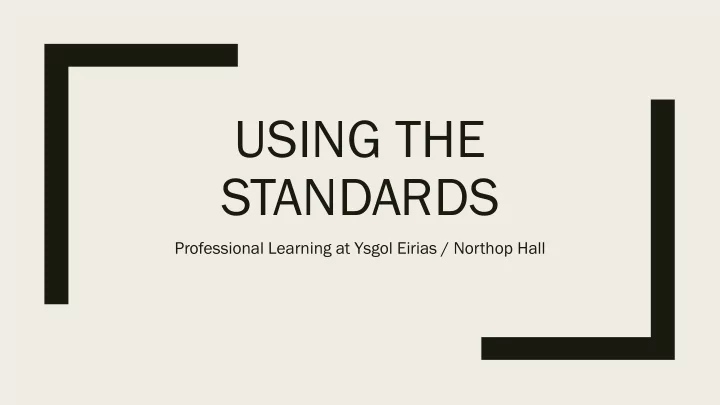

USING THE STANDARDS Professional Learning at Ysgol Eirias / Northop Hall
Context Ysgol Eirias: ■ Large secondary school (100 teachers; 15 TAs); ■ Professional Learning Pioneer school; ■ Piloting new standards in a range of activities for 2 years Northop Hall CP: ■ Medium sized Primary (9 teachers; 8 TAs); ■ Not involved in Pioneer projects; ■ No prior involvements with standards before publication
Using the standards for SIPs and their role in Performance Management ■ NH have used standards in the SIP in order to ensure that any strands coming from the SIP are addressing the new standards for staff in the school (in addition to the primary purpose of learner progress); prior to Performance Management, staff have self evaluated their confidence in standards using a grid evolved from Ysgol Gwynedd’s example. ■ YE have used the standards in the SIP and as a guide for Performance Management target setting to ensure engagement and enhance development
Evaluating confidence (NH) ■ Developing familiarity with the standards and identifying areas to develop ■ This is not a formal part of our PM process but creates an opportunity for discussion and guides PL for both individuals and the school
Links to Performance Management ■ Identifying aspects of the standards within our PM
Built onto our School Improvement Plan
Professional Learning Standard (YE) ■ Within the Professional Learning Standard there are 4 descriptors:
Unpicking the strands… ■ The initial 2 strands may be difficult to address in a school setting: ■ Wider reading and research findings ■ Professional networks and communities ■ The descriptors are as follows:
Action Research Groups ■ In order to try and support all staff in addressing these standards, the school has piloted the development of Action Research Groups. ■ This involved staff working in groups linked to pedagogical areas (from Donaldson’s Successful Futures) and spending allocated time together researching an area of interest and putting it into practice. The Action Research was shared in a variety of ways at the end of the year (staff training presentations, small group sharing, faculty team meetings, case studies etc.). ■ In order to ensure that staff were aware of how to conduct Action Research, a representative from Bangor University came to school to deliver on the concept and strategies. The Action Research does not need to be large scale: it can range from working effectively with a student with ASD to implementing specific AfL strategies across differing ability groups in Year 9.
Action Research Groups Mentoring (Building on Prior Knowledge) Digital AfL Competence ALN Literacy & (Positive Numeracy Relationships) Action Welsh Bacc Research Learner (Collaboration) Autonomy Groups
Examples of Action Research Projects: Developing questioning strategies with Year 10 to develop their own oracy skills; Using effective peer assessment with Year 7 in a skills based project; Investigating strategies for supporting student X with ASD in PE; Improving the facility of lower school support through peer mentoring systems; Supporting trainee teachers in terms of good mental health; Investigating the effect of literacy intervention strategies in subjects other than English.
Development of ARGs ■ In the second year of implementation, ARGs have been made much more personalised: staff have been able to offer to run an ARG and there has been no restriction on topic. Subsequently, there are far more options to choose from and smaller, more focused groups. ■ Standard descriptors that have additionally been met include: ■ Collaborati ration n – Work rking ng with th in-scho school ol collea eagues: s: ■ The teacher actively promotes and facilitates collaborative opportunities for staff, both in routine aspects of learning organisation and in innovative approaches. ■ Innovatio tion n – offe feri ring ng experti tise se: ■ Expertise and experience is brought to bear by contributing professional skills to help other colleagues address new challenges. ■ Leader ership hip – Taking ng responsi sibility for self: f: ■ Personal professional responsibility includes the sustained development of highly effective practices across the professional standards.
Meeting the standards ■ These kinds of activities – whether whole school based or autonomous – facilitate enhancing of the standards. ■ The evidence for the success of the pilot is in the range offered in the second year and the engagement of staff.
Mentoring (Building on Prior Knowledge) Digital AfL Competence ALN Literacy & (Positive Numeracy Relationships) Action Welsh Bacc Research Learner (Collaboration) Autonomy Groups
Using Data Maths Effectively Pastoral Data Homework Use Retrieval Vocabulary Practice Blended Nurture Group Learning Student Mentoring Wellbeing Humaities MAT Provision AoLE Cognitive Diversity Science Awareness Behaviour Cymraeg Management Physical Literacy Literacy Action Blended Transition Research Learning in Curriculum Cymraeg Groups
Where are you? ■ This is an example of a large secondary school who have been piloting standards for 2 years and a medium sized Primary who have not been involved in the process. ■ Where are you in the journey? ■ What have you done so far? ■ What would a realistic next step be? ■ How will you implement it?
Recommend
More recommend